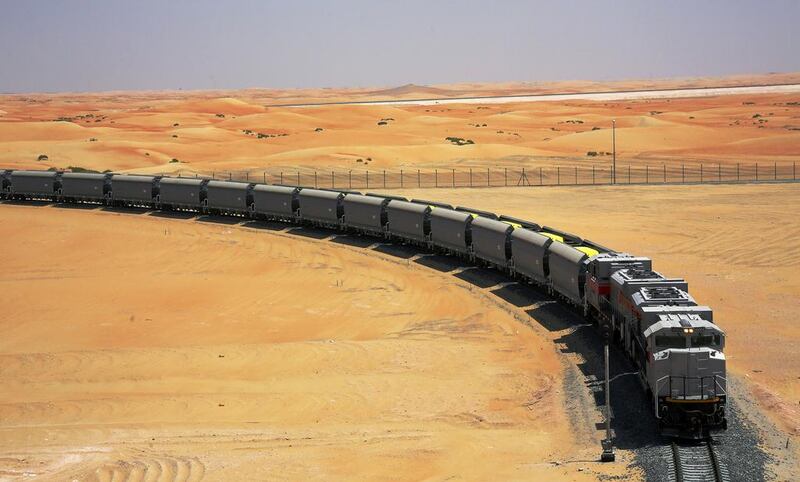Etihad Rail has transported more than two million tonnes of sulphur from Shah and Habshan in the hydrocarbon-rich Western Region to the port of Ruwais over the past year.
The company, established in 2009 to develop the UAE’s freight and passenger railway networks, said yesterday that it had made the shipments – the equivalent of 66,000 truck trips – over the past 12 months during trial operations.
Since the 264-kilometre first phase of the railway network was completed last year, Etihad Rail's operating partner ERDB has been running freight trials on a daily basis, transporting the sulphur, a major byproduct of oil and gas production, for the Abu Dhabi National Oil Company (Adnoc).
Etihad Rail said that full commercial operations were expected to start “shortly” once the company has been granted its regulatory approvals.
When this happens the amount of sulphur transported by rail is expected to more than triple, with Etihad Rail aiming to shift 7 million tonnes of sulphur every year for Adnoc once it enters into full commercial operations.
Sulphur is produced in massive amounts in sour gasfields as hydrogen sulphide is removed from the gas before it can be exploited.
This means that the UAE is expected to produce close to 10 million tonnes a year of sulphur, making the country the world’s top producer of the element. The sulphur will be exported to fertiliser plants around the world.
The amount of sulphur expected to be produced from the Shah field alone is close to 3 million tonnes a year, equivalent to the yearly production of sulphur for the entire country of Japan.
Etihad Rail's fleet currently comprises seven locomotives and 240 hopper wagons which transport the granulated sulphur from two plants in Shah and Habshan to the sulphur handling terminal at Ruwais.
“Transporting more than 2 million tonnes of sulphur in the past year clearly demonstrates Etihad Rail’s unique value proposition as a reliable, safe and environmentally friendly mode of transport,” said Faris Saif Al Mazrouei, Etihad Rail’s chief executive.
The Dh40 billion Etihad Rail project is being built in three main stages. Eventually the network will stretch 1,200km across the UAE, connecting each of the seven emirates with a GCC-wide railway network.
Economists say that the new network should enable the UAE’s manufacturers to expand more quickly.
“Improvements to infrastructure are certainly important for economic growth, and [Etihad Rail] should help to support the movement of goods and people around the region,” said Jason Tuvey, an emerging markets economist at Capital Economics. “The project will help companies to move raw materials, which should help heavy industries in the Gulf, and bring down costs.”
A second phase connecting Jebel Ali in Dubai with Khalifa Port in Abu Dhabi is also planned. Contracts to undertake work on the 628km freight phase of the railway line were first tendered in 2012 but so far none have been awarded.
lbarnard@thenational.ae
Follow The National's Business section on Twitter





